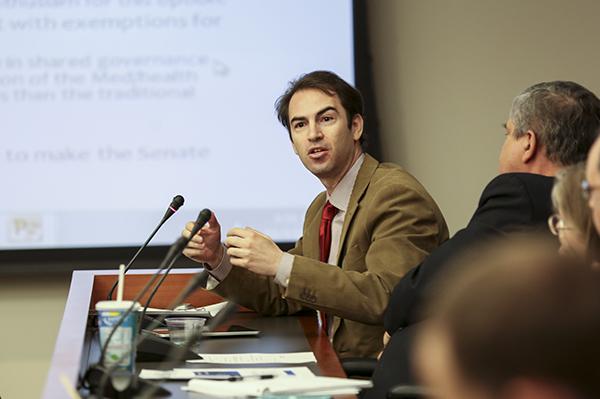When it comes to determining participation in the University’s decision-making, health-related faculty made their voices heard.
Most of the faculty who voted at last week’s all-faculty meeting were from health-related schools, which have been some of the most vocal about including specialized faculty in University decision-making. The high level of participation showed their support for being included in the Faculty Senate.
Last Tuesday, 23 percent of faculty from across the University participated in an assembly to vote on including non-tenured faculty in the Faculty Senate – a body that decides on policies for the University. Charles Garris, the chair of the Faculty Senate’s executive committee, presented the number of votes from the Faculty Assembly at Friday’s senate meeting.
The resolution failed, and participation in the Faculty Senate will continue to be limited to tenured faculty.
The turnout of voters from the Milken Institute School of Public Health had the highest percentage of faculty within a school who registered as voters. Sixty-two faculty members voted, meaning that about 60 percent of the school’s faculty took part in the assembly.
Lynn Goldman, the dean of the public health school, said at Friday’s senate meeting that because the number of specialized faculty in the school is so high, it was obvious that those faculty and their colleagues wanted to pass the resolution to extend participation in the Faculty Senate to specialized faculty.
“I am amazed by turnout of my faculty and faculty from School of Medicine. I am very encouraged by that,” Goldman said during Friday’s meeting. “We’ve been trying to make our faculty understand that senate and membership in the faculty assembly is the highest order of service at the University, and hopefully they want to take part.”
The School of Engineering and Applied Science and the School of Nursing saw the next highest percentage of voters from their schools at about 40 percent each.
The Elliott School of International Affairs had the lowest turnout, with only five international affairs professors who voted at all.
Gregg Brazinsky, a professor of international affairs, said he expected low turnout from his school because his colleagues are “agnostic” on the issue of governance.
“Maybe every school should decide what’s best within that school,” Brazinsky said. “That’s part of the way we can completely rethink the issue of what needs to go on.”
The Columbian College of Arts and Sciences had the largest number of voters with 174 faculty in attendance out of the 500 faculty members in the school.







